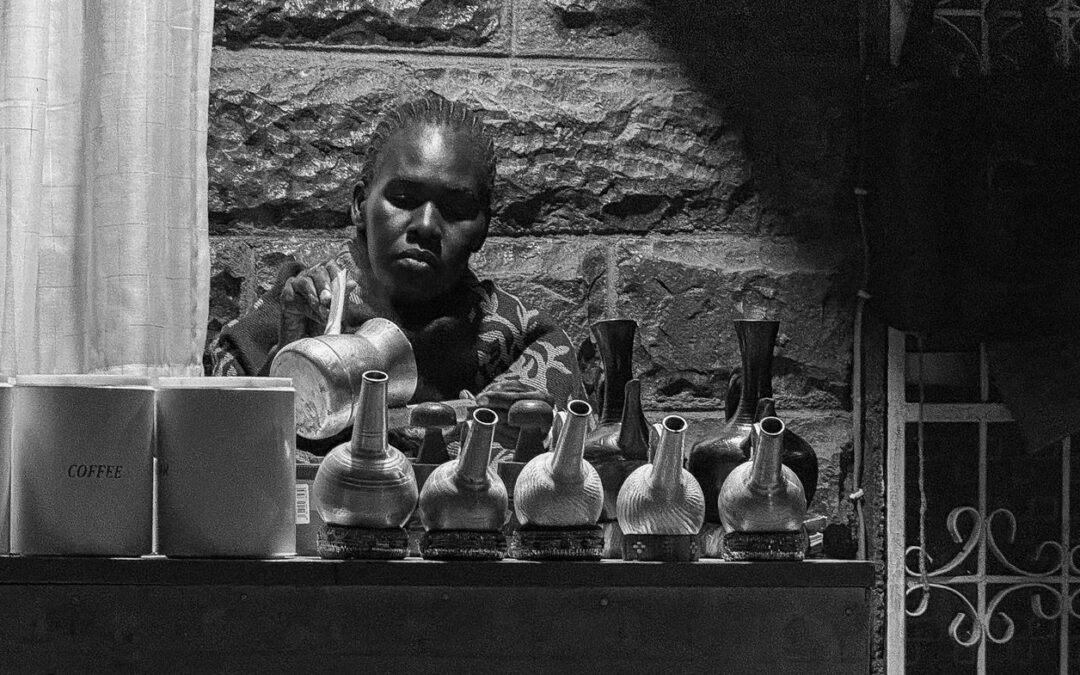
Sep 8, 2025
Each day as Yusriya starts work in her tarabiza in northern Sudan, she sets up the roadside stand with a few pots, a stove, plastic or wooden chairs, and hot beverages such as tea, coffee, ginger, hibiscus and other herbal drinks.
“It was hard at first, but when I see my kids eating because of my work, I feel proud,” said Yousriya, who supports a family of 11.
Yet after a 12-hour day, her income ranges between 15,000 and 20,000 SDG ($25-$30), which barely covers monthly rent (250,000 SDG / $416).
“We need an extra 300,000–500,000 SDG monthly ($500-$832) to live with dignity and manage emergencies or sickness,” she said.
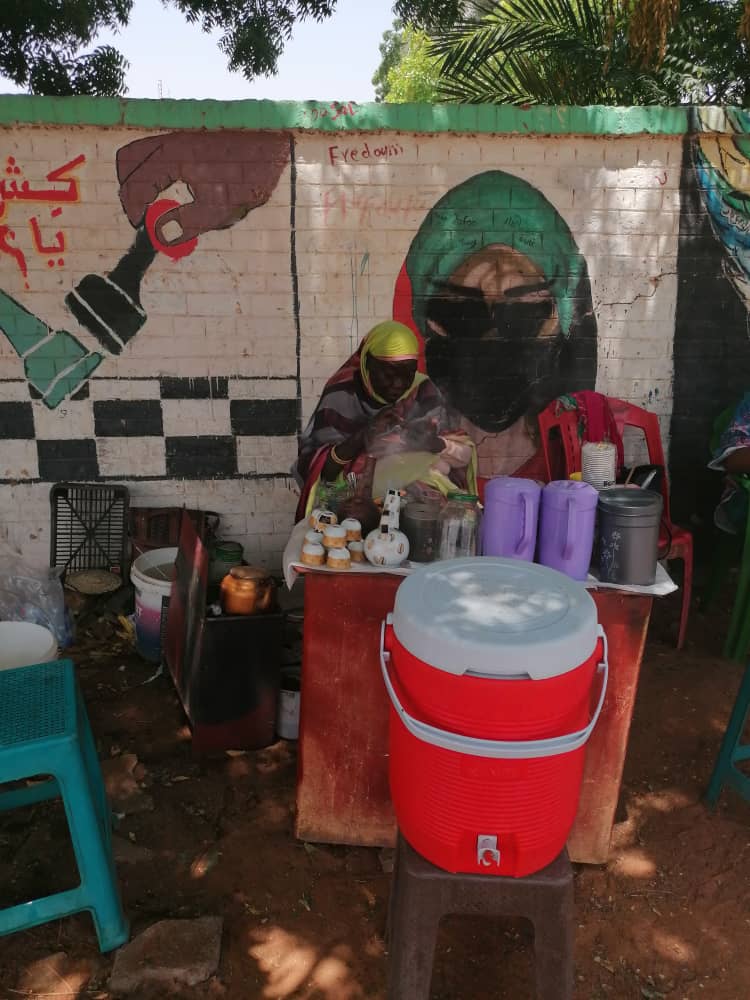
Awadeya Mahmoud, a tea seller in Kenya, is among many workers who needed to move from Sudan during the war to support themselves and their families. Credit: Solidarity Center / Hana Abubaker
Roadside stands where people sit to drink tea are common. Yet tea sellers, who are primarily women, often work long hours for little pay in part because of harassment from government agents forcing them to pay “fines,” damage equipment they must pay to replace or because they have to relocate their stands—often to another city.
As the war continues in Sudan, more and more workers must support themselves in the “informal economy”—jobs not in traditional places such as offices and transportation.
Food vendors, like Yusriya, and domestic workers form a cornerstone of the popular economy yet remain excluded from legal protection and are routinely subjected to forced evictions, arbitrary fines, confiscations, harassment and restrictions on forming unions.
Crafting Tools Workers Can Use to Build Better Lives
To address the steep municipal licensing fees that threaten tea sellers’ livelihoods and exclude them from local decision-making, the Solidarity Center is formalizing an agreement between tea sellers and local governments that improves safety and health and provides the freedom tea sellers need for better wages.
The agreement outlines tea sellers’ commitment. Local governments that sign on will designate specific areas where tea sellers can sell tea and provide work permits or licenses to protect them from harassment by authorities.
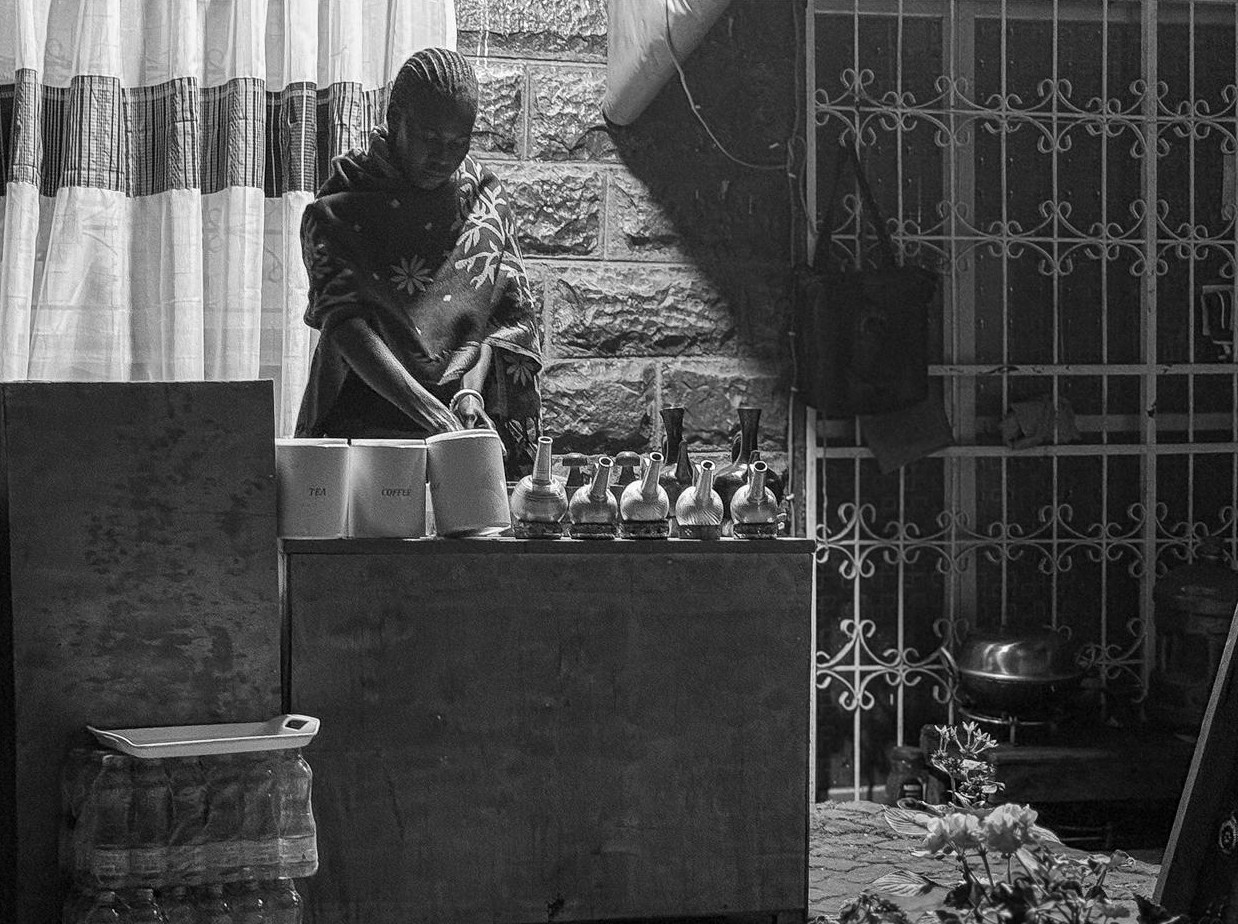
Khadmallah begins selling tea and coffee at 6 a.m. Credit: Solidarity Center / Hana Abubaker
The agreement “will end illegal fines and raids, and give me a fixed place to work,” said Saadiya Mohamed Ahmed Fadl, a tea seller who works daily from 4 a.m. to 7 p.m.
It also ensures tea sellers have access to health care. “Health insurance is vital,” says Yousriya. Workers will be enrolled in the government subsidized medical insurance program and receive access to microfinance funds, enabling them to improve their work and income.
The Trade Union of Tea Sellers and Street Food Vendors, established before the outbreak of the current war, represented an important attempt at organizing. But war disrupted union activity and the Solidarity Center’s efforts to establish agreements with municipalities are key to gaining recognition and reducing harassment at the local level.
In ongoing negotiations, the Solidarity Center is making steps to establish work agreements that provide legal recognition and improve security and fair treatment for tea and food vendors, an essential step toward safeguarding their livelihoods in Sudan’s fragile economic context.
Achieving Legal Protection
With assistance from the country’s legal aid organization in drafting the agreement, the Solidarity Center has crafted a model that can be used across the country. The Solidarity Center is creating agreements in 16 localities in three states, and has now connected with the prime minister and minister of social development to pursue similar accords with the other 15 states.
In securing legalized status and comprehensive legal protections for tea vending as a recognized economic activity, the agreement advances the Solidarity Center’s goals to help workers secure fundamental freedoms-– fair wages, safe workplaces and the right to form associations and unions.
The Solidarity Center also is seeking to register the tea sellers’ association.
Through unions, workers gain the tools, confidence and networks to lead the change they need on their own terms—a goal Yousriya says will provide collective strength to advance. “Forming a union allows me to get a bank loan to expand my business and offers protection,” she said.
In the legal agreement’s first formal violation report that highlighted recent abuse and restrictions tea sellers face in River Nile and Khartoum states, the government committed to take concrete action to protect their human right to work and uphold their dignity.
The Solidarity Center is also advocating for their legal recognition and inclusion in Sudanese labor law and is providing legal aid, rights training and social protection awareness to ensure workers have the tools to stand up for their rights, build stable communities and strengthen democracy.
The agreements and legal success mark a critical milestone in building institutional accountability and opening channels of dialogue between informal workers and state authorities. They also represent an important precedent for ensuring that women working in the informal economy are treated with fairness and respect under Sudanese law.
Establishing a First-Ever Contract for Domestic Work
Domestic workers—who care for children and clean houses—typically also must live in their employers’ homes six days each week, and have no contract with their employer covering wages, hours or working conditions. In Sudan, where some 100,000 make their living as domestic workers, the vast majority are women and girls from low-income or displaced backgrounds.
Together with a legal consultant, the Solidarity Center developed a detailed contract template covering wage payment, work conditions, health access, annual leave, rest periods, accommodation for live-in workers and breastfeeding and prayer breaks.
The Solidarity Center also is seeking to register their association so they can better organize, collectively bargain their work conditions and wages and ensure the agreement and the contract are implemented.
Emtithal Abdo, who supports nine people with her job as a domestic worker, says the contract “raised awareness about our rights-–how to get fair wages that match the nature and effort of the job, and knowledge of basic rights (such as health care and education). It helps balance worker rights and responsibilities, and promotes the right to organize and have a safe and healthy work environment.”
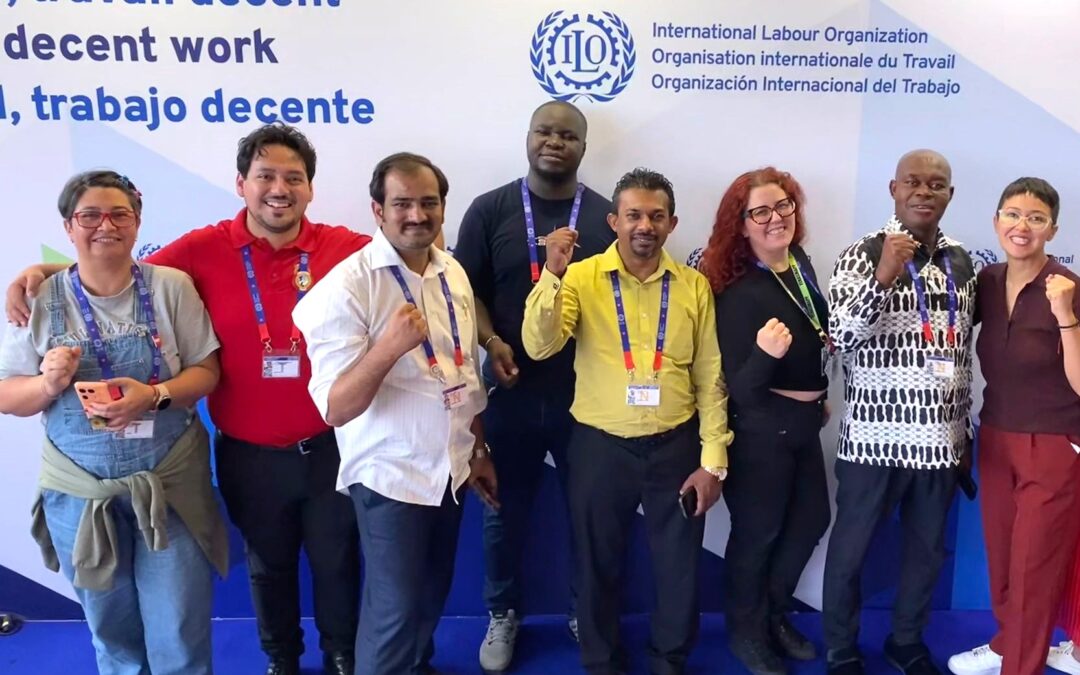
Jul 30, 2025
At the 2025 International Labor Conference (ILC), which took place June 2-14, the Solidarity Center and its partners showcased what happens when workers join together: they speak up and fight for better jobs—and a better world.
The ILC, the annual meeting of the International Labor Organization (ILO), brings together worker, employer and government representatives to debate policy, make decisions and negotiate new international labor standards to promote decent work.
As a result of our unique partnerships with working people and unions from around the world, workers assumed an active role throughout the ILC conference, building on our guiding principle that if working people have the freedom to organize and bargain, they will build more just, inclusive and democratic societies.
With Solidarity Center, Platform Workers Shape a Global Treaty
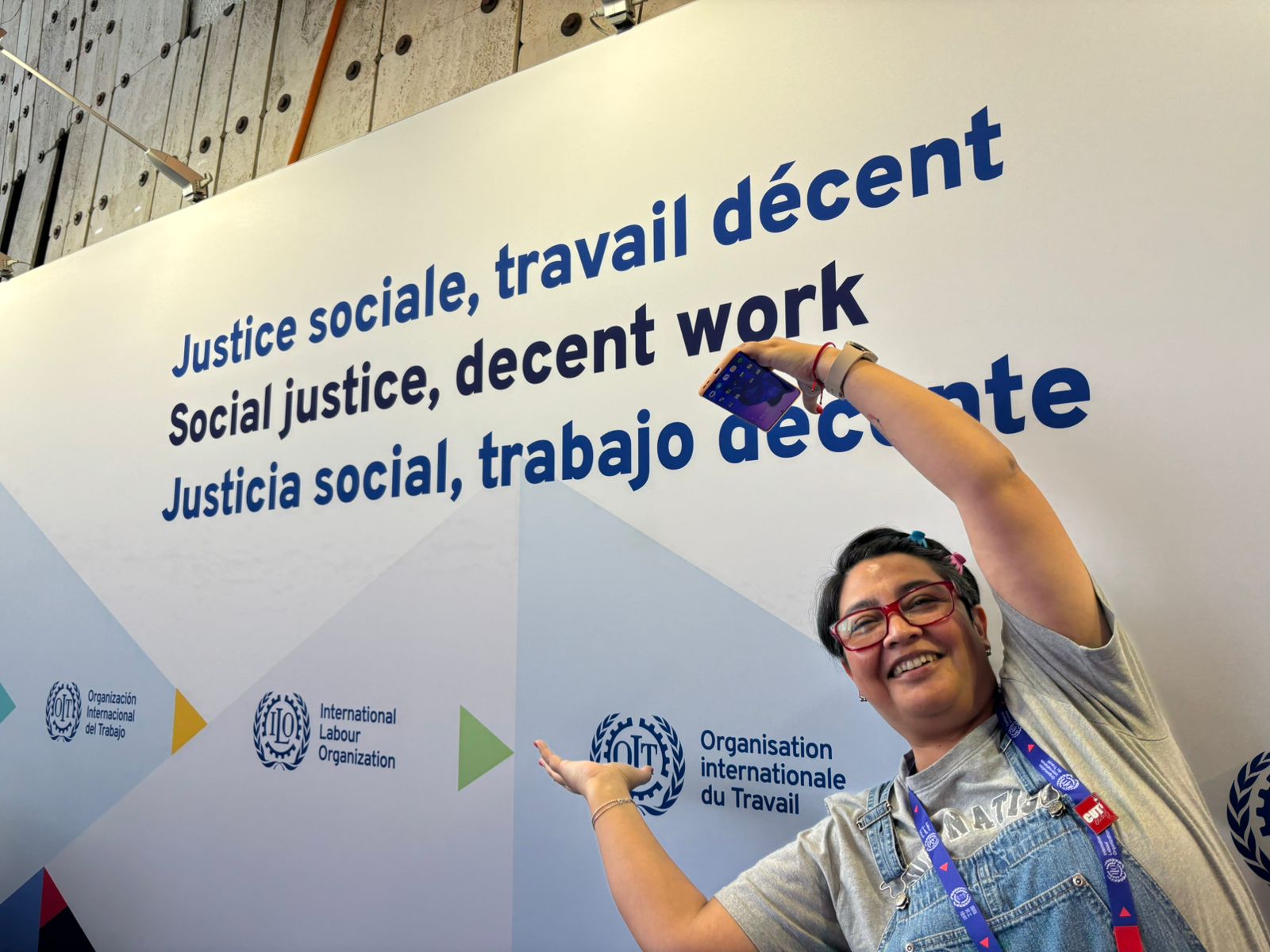
In Chile, Solidarity Center delegate Angelica Salgado Delgadillo heads the Cornershop Union of Uber and serves as a national councilor in the Central Unitaria de Trabajadoras y Trabajadores (CUT). Credit: Solidarity Center
Between 154 million and 435 million workers have online jobs around the world. While platform work is associated with ride hailing and delivery, a broad range of digital platform work is now happening through apps and websites.
A new ILAW Network publication, Taken for a Ride 3 – Lost in a Crowd: How Crowdworkers Are Denied Their Rights at Work, looks at how content moderators, software programmers and other digital platform workers engage in data-related tasks and yet receive no basic workplace rights.
Following years of research and advocacy for the development of a global treaty promoting decent work for app-based workers, led in part by the Solidarity Center’s ILAW Network, the ILO began the process to negotiate a first-ever Convention establishing decent work for platform workers worldwide. (Conventions are legally binding international treaties that may be ratified by member countries.)
“The Solidarity Center Rule of Law team participated actively in the negotiation for a new standard addressing decent work on digital labor platforms, while the Solidarity Center’s Organizing Department coordinated with national platform workers unions to facilitate their participation in the work of the committee,” said Jeffrey Vogt, Solidarity Center Rule of Law director, who also leads the Center’s International Lawyers Assisting Workers (ILAW) Network.
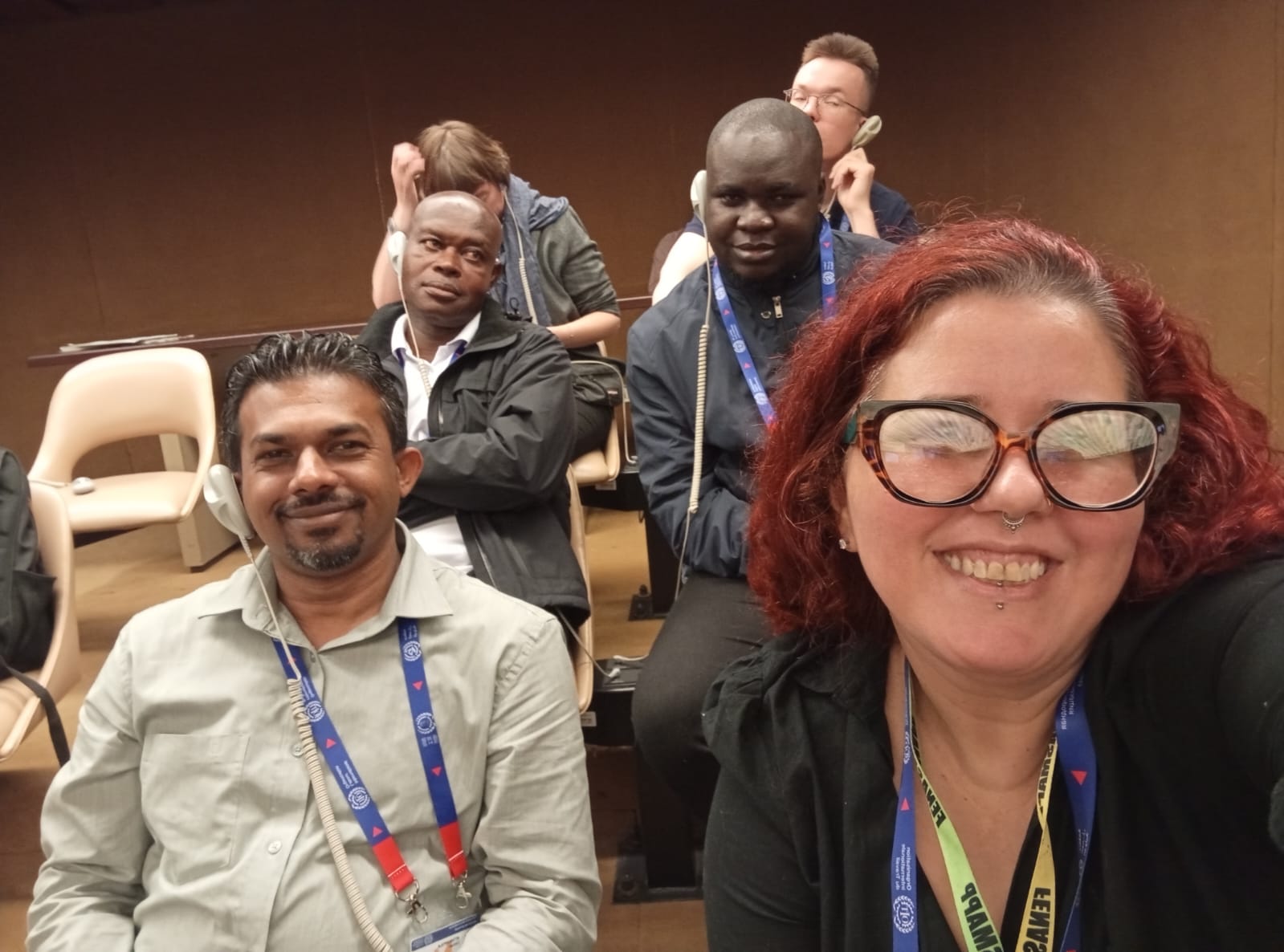
Worker delegates connected with their governments to win support and improvements in an international treaty on the rights of platform workers. Front from left: Charith Attanapola, Sri Lanka; Carina Trindade, Brazil. Rear from left: Philip Aryeh, Ghana; Mophat Okinyi, Kenya. Credit: Solidarity Center
To develop a Convention, workers, employers and government members meet in Geneva to debate and draft its content, and the June conference was the first of two such meetings. Together with digital app-based workers from seven countries, Brazil, Chile, Ghana, Kenya, India, Mexico and Sri Lanka, the Solidarity Center efforts were key to ensuring the proposed Convention and its Recommendations represented workers’ real-life experiences and concerns.
Months before the June ILC met to consider Convention proposals, Solidarity Center worked closely with the platform worker delegates, ensuring they were part of every step—contributing to the ILC’s multiple draft reports, advocating with lawmakers and engaging in training to hone their messages.
“By bringing together workers from multiple regions, the ILC served as a powerful space for South-South exchange,” said Kruskaya Hidalgo Cordero, Solidarity Center field organizing specialist. “Delegates strengthened trust, shared strategies and discussed common challenges such as ensuring labor standards cover digital platform workers.”
Building Worker Power, Democracy
With input into creating the latest draft, the involvement of the Solidarity Center conference delegates was key in discussions and in developing the most recent outline.
Closely coordinating with their unions at the conference, worker delegates provided feedback and recommendations to their government represetatives—who in turn often took supportive positions, raising key points during negotiations and in some cases, adjusting their votes.
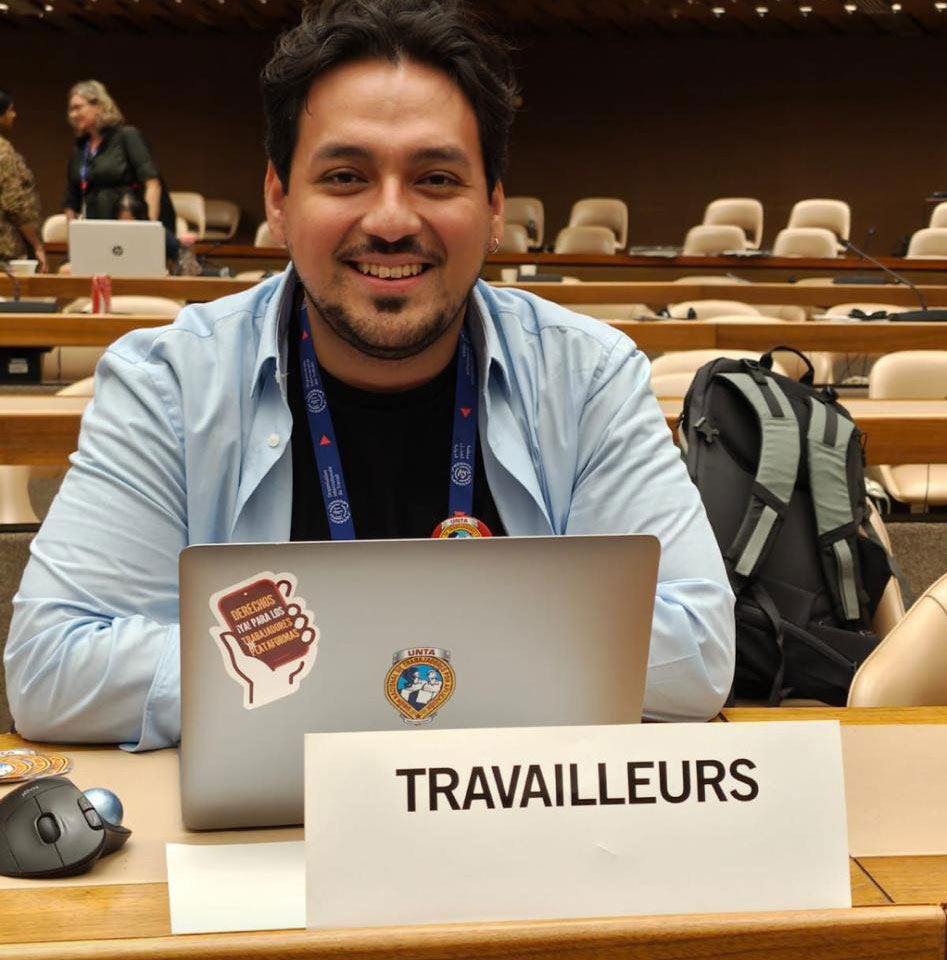
Sergio Guerrero from Mexico was among seven platform workers collaborating with the Solidarity Center to ensure decent work in the gig economy. Credit: Solidarity Center
The result, “Decent Work in the Platform Economy,” was a commitment to a Convention and Recommendation at the end of the process, as well as negotiated definitions and some initial language on the rights of workers to obtain information on automated systems. The platform workers will continue to hone and refine drafts throughout the year, with a final Convention and Recommendation likely adopted at the next ILC in June 2026.
Through ILC participation, the Solidarity Center enabled strong worker power—and worker democracy. Going forward, as part of the Organizing Department’s global platform and broader strategy on platform work, Solidarity Center will create a dedicated space for cross-regional collaboration. Digital app-based workers will take part in a series of virtual exchanges where they will share organizing strategies—strengthening bonds and coordination across regions.
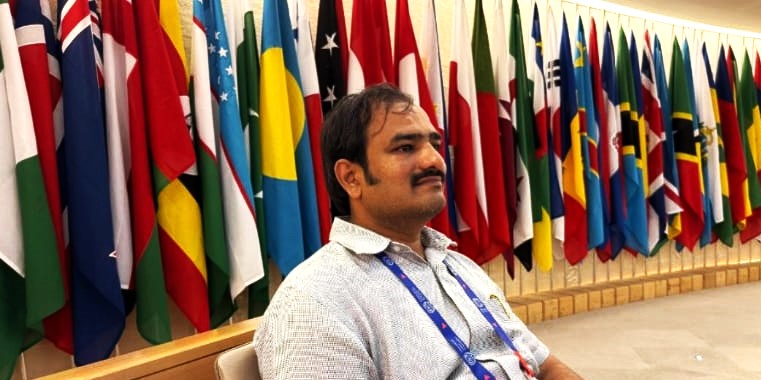
Digital app-based driver, Shaik Salauddin from India, part of the Solidarity Center delegation, frequently reaches out in social media through his union. Credit: Solidarity Center
Creating international connections at the ILC, where digital app-based workers initiated relationships with key global allies , expands connections not only for their organizing networks but also embeds platform worker issues more firmly within global union agendas.
“These interactions deepened the foundation for a worker-led international network capable of sustained collaboration beyond ILC spaces,” said Hidalgo Cordero.
Including Workers’ Voice
To ensure that workers are in the conversations around the informal economy, one Solidarity Center strategy included collaboration with Saida Ouaid, a member of the Democratic Confederation of Labor (CDT) in Morocco.
Ouaid represents agricultural workers, who are among the two billion people globally supporting themselves and their families in the informal economy—including street vendors, domestic workers and tuk-tuk drivers. These workers are not covered by “formal” economy protections, such as job safety and health or health care.
Ouaid actively participated in the ILC general discussion Addressing Informality and Promoting the Transition to Formality for Decent Work to reflect on progress made since the adoption of ILO Recommendation 204 and what else is needed to advance the transition to formality, in recognition that informality remains high.
“Being present gave me the opportunity to voice my organization’s position, which is the urgent need to improve the conditions of informal economy workers and to integrate them into a formal economy that meets the standards of decent work and dignified living,” she said.
The Solidarity Center also provided materials to union partners who sought to participate in the ILC discussions, including several from around Africa. And, the Solidarity Center coordinated positions and priorities with the International Domestic Workers Federation (IDWF), UNI Global and Women in Informal Employment Globalizing & Organizing (WIEGO), key to its efforts to build long-term alliances with global unions and other allies.
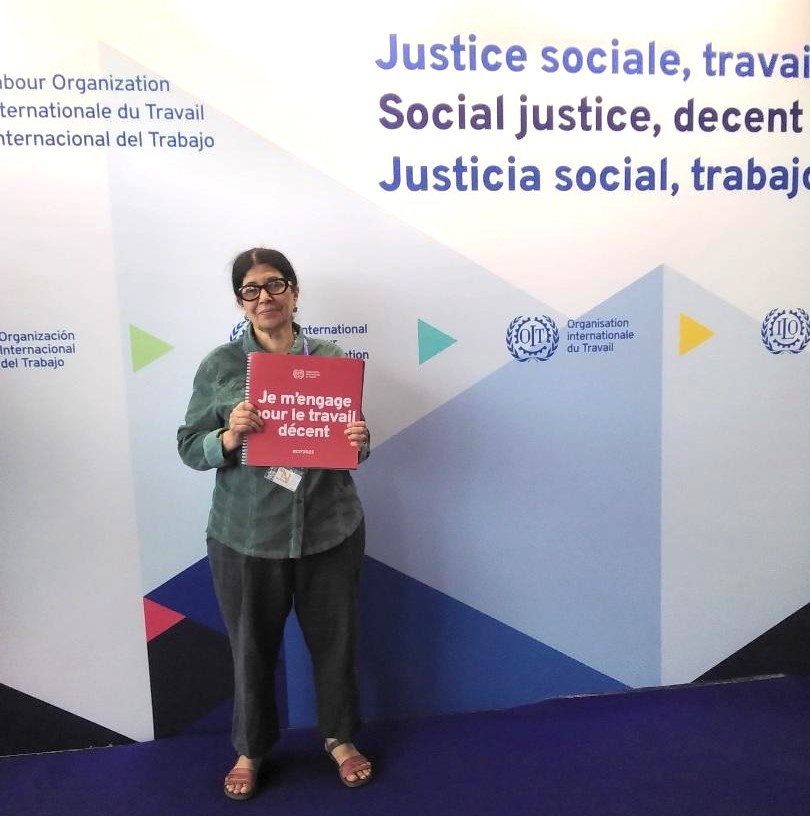
Solidarity Center delegate Saida Ouaid, a member of the Democratic Confederation of Labor in Morocco, pushed to improve conditions for 2 billion workers such as those in agriculture and street vending who are in the informal economy. Courtesy Saida Ouaid
Because working people and their union representative such as Ouaid were a key part of the discussions, they pushed back employer attempts to restrict union membership and collective bargaining to formal workers in accordance with national laws. Ultimately, the final document represents the success of working people in upholding the freedom to form unions and the right to collectively bargain as a right for “all workers” as essential for transitioning to inclusion in fundamental labor rights.
Including workers’ democratic freedom to form unions and bargain together recognizes the Solidarity Center’s core principle that unions are the democratic institutions of the working class that allow working people to stand together, speak up and bargain not only for better jobs, but for a better world.
“Attending this session was a rich and meaningful experience, through the contributions, testimonies and shared experiences of trade unions, during both the Workers’ Group meetings and the general sessions,” said Ouaid.
Workers’ Succeeded in Adding Key Rights
Working in agriculture, as a street vendor or in other jobs in the informal economy increases people’s vulnerability that typically cannot be addressed by a country’s basic labor protections. Workers at the conference were key to the adoption of new language on the necessity of employer and government accountability and creates an environment for transitioning to jobs in the formal economy that lead to worker protections.
Workers’ involvement also shaped the outcomes document so that it represents their lived experiences and the necessity for safe working conditions, by
- Acknowledging the importance of a safe and healthy working environment to decent work and
- Recognizing the role that trafficking, exploitation, stigmatization and harassment in hindering formalization efforts.
“There were a number of important provisions proposed by the workers’ group that were able to ensure the rights of informal economy workers in the final outcomes,” said Erin Radford, senior specialist in Solidarity Center’s Global Worker Empowerment Department.
“In other cases, the workers’ group was successful in eliminating harmful amendments proposed by the employers’ group or governments or in reducing the harm of the amendments. In particular, it was important to ensure nothing in these outcomes would undermine or weaken the 2015 document.”
See all the texts adopted in the June 2025 conference: Texts adopted by the International Labor Conference at its 113th Session.

Jul 21, 2025
Providing workers around the globe with the tools they need to achieve decent wages and safe working conditions, the Solidarity Center strengthens workers’ ability to engage in such democratic practices as the ability to freely speak out, form unions and associations and shape the futures for them and their communities.
Through funding by the National Endowment for Democracy (NED) high-impact democracy investments, the Solidarity Center is bringing about its core belief that when working people have the freedom and tools to join together in unions and associations, bargain with employers and steer their own course, they will build more just, inclusive and democratic societies.
In recent years, Solidarity Center has transformed millions of lives in dozens of countries:
- Enabling working people to improve access to health care in Nigeria, where the government provided nearly $70 million to bolster the country’s health infrastructure following a Solidarity Center effort advocating increased public spending on health care and boosting health care workers’ wages and working conditions;
- Building power with more than 1,000 workers cutting and harvesting sugar cane in the Dominican Republic to secure decent wages and living conditions and safety at work by exercising their democratic freedoms;
- Improving health and safety at more than 1,000 worksites in Serbia through training and support, which also enabled workers to collaborate with the government and the Serbian Association of Employers to address safety and workplace health hazards.
- In Thailand, Solidarity Center improved conditions for workers making garments and electronics in supply chain factories, Solidarity Center efforts assist workers in their efforts to collect unpaid wages, such as at the Brilliant Alliance Thailand (BAT).
“With the support of Solidarity Center, which negotiated directly with the multinational company (the customer of BAT), 1,250 workers won back $8.3 million in wages and severance payments owed to us,” said former garment worker, Teuanjai Waengkham.
The Philippines, Central Asia, Morocco and the Maldives provide more glimpses in Solidarity Center efforts to strengthen a new generation of advocates for workers’ fundamental rights, and improve wages and job safety that often expand to nonunion workers and entire communities.
Fair Wages in the Philippines
Across the Philippines, workers are frequently not paid what they are owed. Bolstered by the Solidarity Center, many are now exercising their democratic rights to advocate for—and receive—fair pay.
Solidarity Center efforts led to a recent ruling granting 7.2 million PHP ($128,000) in lost wages for digital platform drivers for FoodPanda in Cebu. As they joined together in their new union, RIDERS-SENTRO, the drivers could connect with local governments to press their concerns and make their voices heard in a fragile democracy.
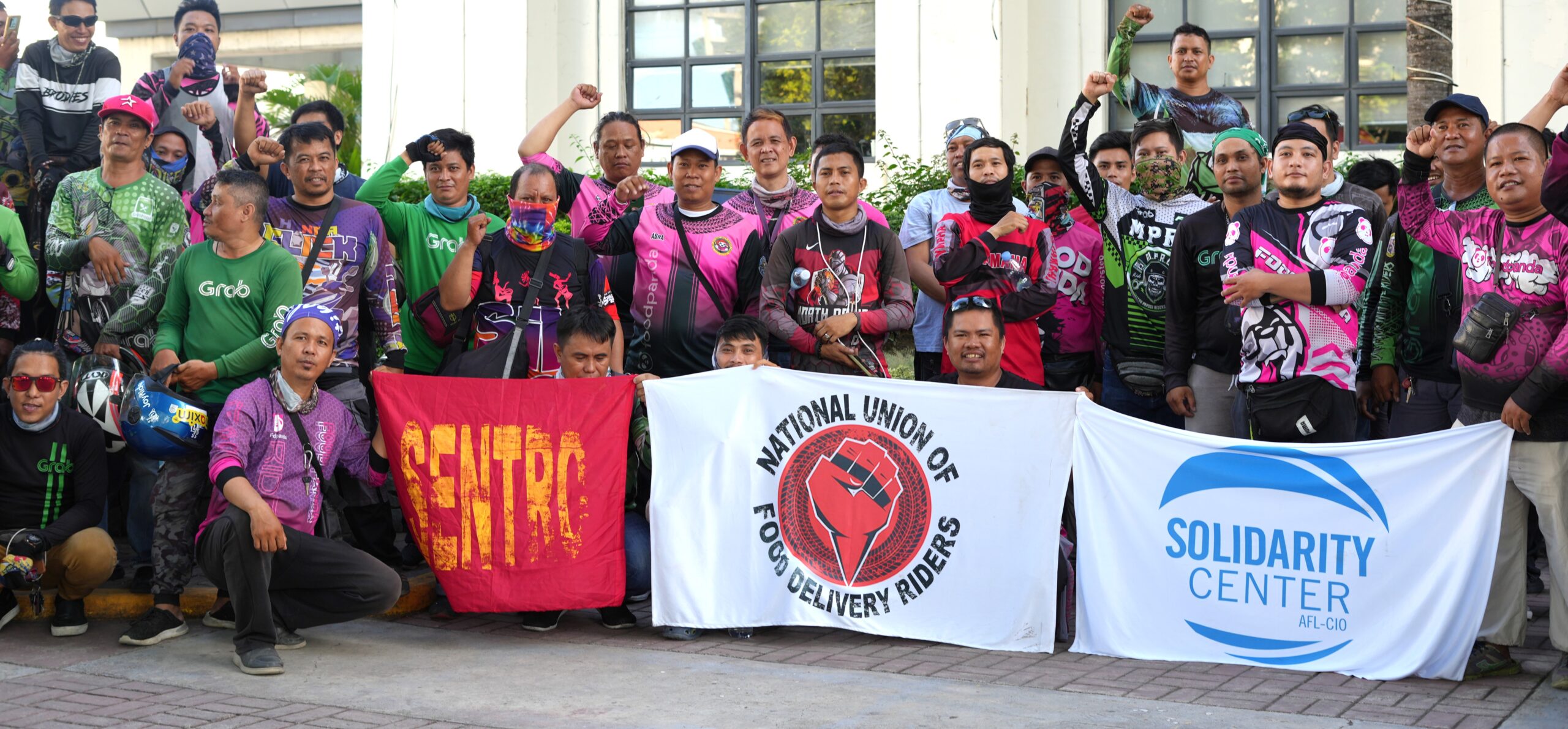
Food delivery riders improved pay at FoodPanda in Cebu, Philippines, part of platform workers’ efforts to assert their rights, protect their lives and improve working conditions.
across the globe.
FoodPanda is appealing the ruling, but the drivers say that with a union, they are confident of their ability to win their rights on the job. When working people have the freedom and tools to organize, bargain and lead, they will build more just, inclusive, and democratic societies.
“Because of the union, we have the fighting spirit for this,” says Abraham Monticalbo, Jr., a RIDERS-SENTRO member. Delivery drivers empowered to achieve decent wages boost their living conditions—and that of their family.
“We realize our power, our rights.”
Forging a New Generation of Workers in Central Asia
Many young people finish school or college and start jobs without knowing their legal rights at work, or how to identify workplace practices that reflect corruption.
In Central Asia, where the Solidarity Center hosts a Regional Youth School, multi-day workshops raise awareness about workplace violations, while empowering young people, as key agents of change, to stand up for worker rights, challenge corruption and take initiative in their communities.
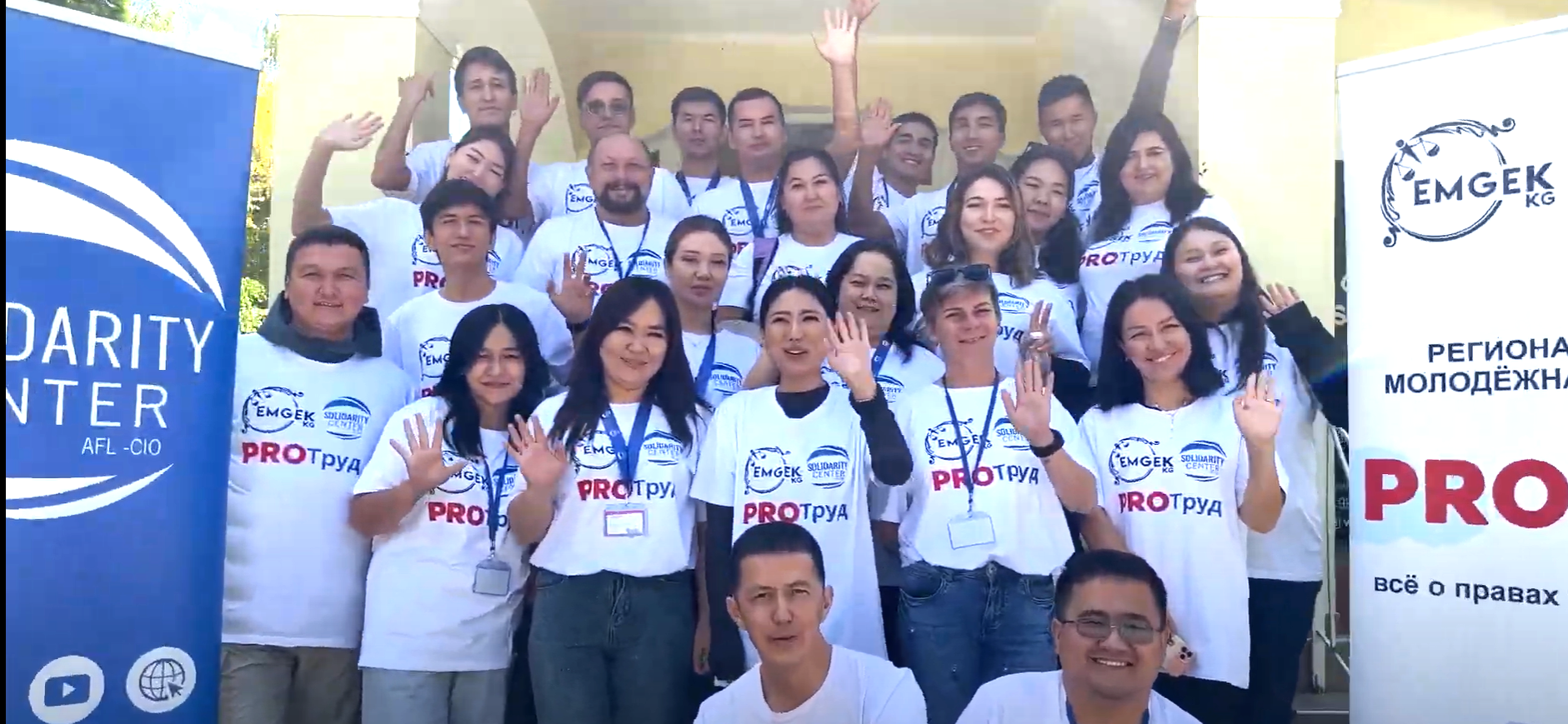
Participants from Kazakhstan, Kyrgyzstan and Uzbekistan took part in a regionwide leadership seminar to increase labor strategies for battling corruption. Credit: Solidarity Center
“We learned how to protect labor rights, how to fight [workplace] corruption,” Salamabekova Meerim, a member of the trade union of medical workers in Kyrgyzstan, said about a recent workshop. “These lessons give us valuable tools to improve our lives and strive for better conditions.”
In a recent three-day workshop, 18 young leaders from Kazakhstan, Kyrgyzstan and Uzbekistan from areas such as health care and mining, engaged in interactive learning that combined professional input with participatory exercises, blending lectures with gamified elements, such as role-playing and interactive tools.
Participants said they plan to hold peer-to-peer training sessions on labor rights and workplace corruption in their countries, countries.
By creating a strong framework—expanding young workers’ ability to turn their ideas into action—the Solidarity Center continues its bottom-up, partnership approach, one that results in permanent, lasting change.
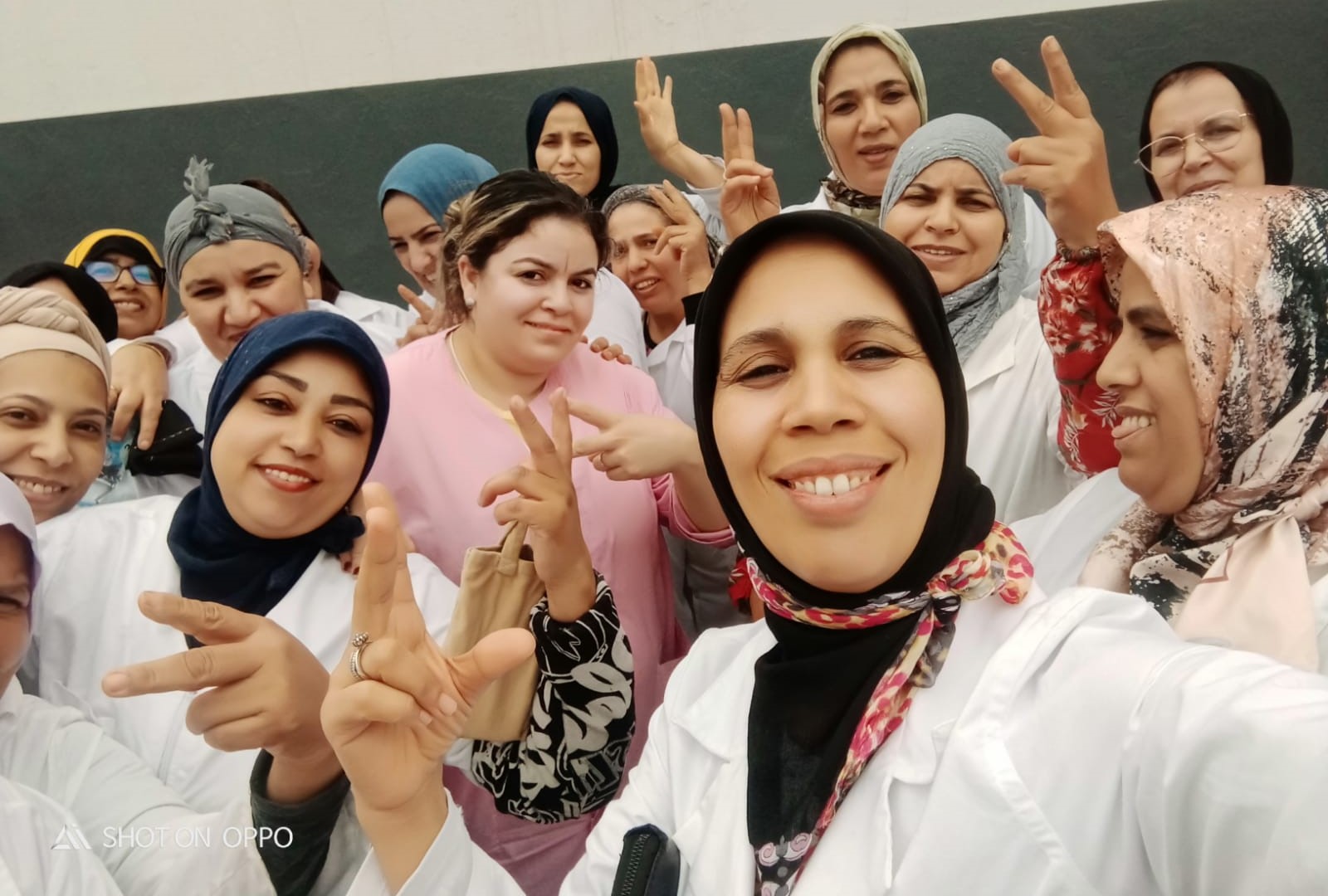
Nearly 2,000 workers at textile factories in Casablanca, Morocco, now can receive decent pay, health care protection and a voice on the job after joining UMT. Credit: Solidarity Center / Hicham Ahmaddouh
Morocco Textile Workers Win Dignity, Decent Work
For the nearly 2,000 workers at seven textile factories in Casablanca, Morocco, forming a union enabled them to receive decent pay, health care protection and a voice on the job. Joining together also meant achieving success when exercising democracy.
“We joined the union primarily to preserve our dignity, which some managers have trampled on,” said one worker, who voted for the union. (Names are not used to protect workers’ privacy.)
In November, the workers formed unions through the Moroccan Workers’ Union (UMT) and the federation of textile workers. Addressing unsafe and unhealthy working conditions was critical in the factories, where they are involved in leather production, sewing, dyeing and garment manufacturing.
They also sought fair wages—workers often were not paid, and received insufficient compensation when frequently required to work overtime—or engaged in fewer hours than specified by the government.
As in countries worldwide, the Solidarity Center teamed up with union partners, in addition to connecting directly with working people to best achieve worker rights. Solidarity Center’s strategy not only enabled textile workers to practice their democratic rights to form unions and improve working conditions, but the efforts also are essential for expanding Solidarity Center’s efforts to broaden worker rights for all of society.
Assisting textile workers in forming unions moves forward their ability to achieve decent wages, safe workplaces and essential health care coverage—and advances their democratic rights to exercise freedom of association, organizing and more.
Without a union, said one worker, “we couldn’t find solutions to our issues or secure our legal rights, which the company has neglected for more than five years.
“We achieved dignity and the freedom to associate, which was previously denied.”
“The Solidarity Center played a critical role in the success of the campaign within the textile sector,” said Al-Arabi Hamouk, general secretary of the National Federation of Textile, Leather and Ready-Made Garment Workers. “The organizing team demonstrated the ability to strategize and address challenges.”
Ending Unpaid Labor, Boosting Job Safety & Health
Nurses and other medical professionals provide patients with crucial support—administering medications, monitoring vital signs, caring for people in hospital beds and more. But in the Maldives, nurses often worked between 40 and 60 hours of overtime each month—all with no pay. Now, 9,000 nurses across the Maldives will now receive overtime pay in full when assigned extra hours of work during public holidays.
“This is a great win for the union workers. Our rights have been neglected for so long, but we have come so far through our work within the union,” says Shifana Ali, a medical laboratory assistant and active participant in the campaign.
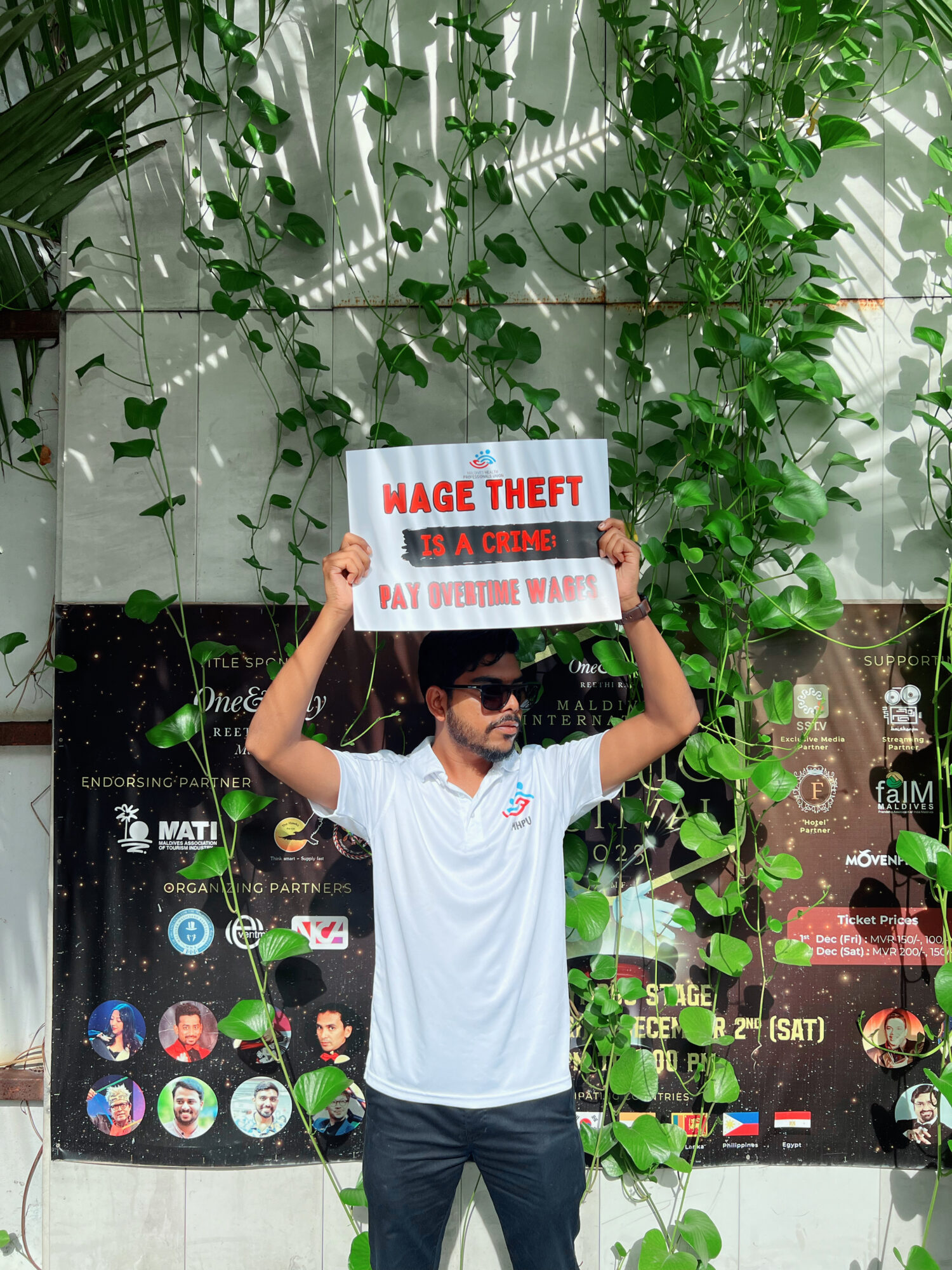
A health care worker holds a sign stating: “Wage theft is a crime–Pay overtime wages.” Credit: MHPU
The Solidarity Center collaborated with its partner, the Maldives Health Professionals Union (MHPU), on a robust campaign to advocate for legislative amendment, which was approved at the end of March and applies to all government healthcare workers.
In doing so, the Solidarity Center moved forward its core principle that when working people have the freedom and tools to organize, bargain and lead, they have the tools to build more just, inclusive and democratic societies. In facing the challenges confronting them, nurses in the Maldives could shape the policies and laws that truly make change for everyone by extending their voice and power through their union.
The Solidarity Center played a vital role in providing training and technical assistance to partner unions, including MHPU. The successful overtime campaign reflects the strategies the union gained, and its new focus facilitated workers in building grassroots, structured organizing efforts focused on strategies that educate and mobilize workers to build collective power.
“We want to ensure that all workers are safeguarded against unpaid forced labor, as it directly impacts both patient care and life beyond work of the individual,” says Fatimath Zimna, MHPU general secretary.
“The Solidarity Center was a huge partner in the campaign in passing two very crucial [pieces of] legislation,” Zimna says.
Achieving nurse overtime pay continued Solidarity Center efforts with the Maldives Trade Union Congress (MTUC) and MHPU to improve job safety and health and the legally guaranteed democratic worker rights, such as the freedom to form unions and take part in peaceful protests.
The Solidarity Center worked closely with the unions throughout much of the decade-long campaign for job safety and health, providing mobilizing and technical training and assisting in the drafting process. Its passage goes a long way toward protecting workers’ rights, says Zimna, and highlights the importance of workers joining together in unions to improve working conditions that also benefit the community.
“It is important for workers to organize into unions and raise their voices collectively to protect workers’ interests to fully entertain the rights given by the two acts.”

Jun 3, 2025
When Enoch Gyaesayor logs into a digital app each day to begin picking up passengers and drive around Accra, Ghana, he hopes to get a few hour-long trips where he can be paid the daily top amount from Mondays to Fridays. After paying the company’s commission and job-related expenses, he says he makes 150 cedis ($14.64).

Enoch Gyaesayor, an app-based driver in Ghana, connected platform workers together in a union to build strength to improve working conditions.
But most of the time, Gyaesayor and thousands of other digital app drivers and riders are paid even less, and often work up to 16 hours a day, even sleeping in their vehicles to save petrol money going home and to be ready to start working again as quickly as possible. Higher pay on weekends does not reduce the amount of time they must work.
“There is no ‘off’ day for the driver,” Gyaesayor says, noting that he works seven days a week to support himself and his family.
In Ghana and in countries around the world, the Solidarity Center is building strength with platform workers to create a broad-based, global movement in which app-based workers join together to assert their rights, protect their lives and improve working conditions. Unions and worker organizations are making democracy real in workplaces, legislatures and global forums.
Digital Platform Work: A Growing Industry that Undercuts Labor Rights
A rapidly exploding industry, digital platform work now employs between 154 million and 435 million workers in online jobs. While often seen as a flexible job arrangement, digital app-based work is a growing business model that systematically undercuts labor rights and protections and shifts the responsibility of costs to workers.
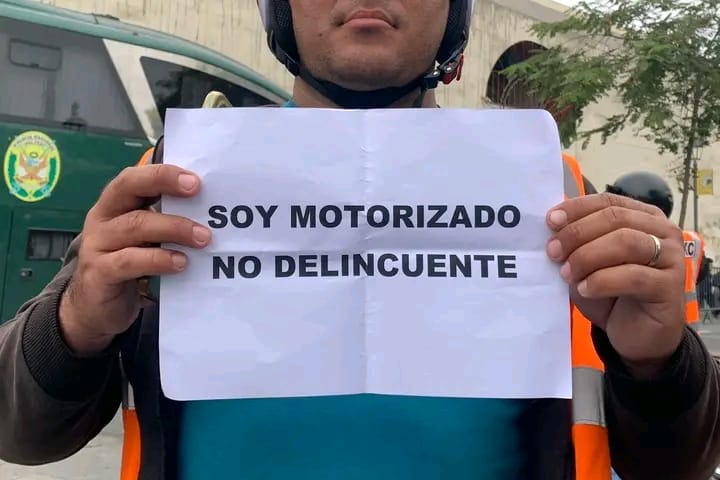
With support by the Solidarity Center and the CGTP, digital platform drivers formed a union to collectively push for decent work and are now at the ILO in Geneva urging passage of a treaty improving work for platform workers worldwide.
Around the world, consumers depend on digital platform workers—requesting rides from Uber or Bolt, ordering meals from Zomato, receiving groceries delivered from Glovo, or viewing content on a social media platform. The online platform acts as an intermediary between the worker and the employer. For most workers, these jobs are not a “side gig”–they are full-time work.
Yet app-based workers in Ghana and in most countries worldwide are defined as “independent contractors,” and so not covered by national labor laws, such as a country’s minimum wage.
Some 3 billion consumers used online food delivery service—groceries and meals—in 2024. Although global food delivery alone was an estimated $380.43 billion in 2024, the workers transporting the food, driving passengers and moderating online content receive little pay and no safe and healthy working conditions.
Joining Together to Improve Job Conditions
Gyaesayor and other platform workers in Ghana say their top concern is to decrease the percentage of the commission app-based companies require drivers to pay. Uber takes 35 percent from workers’ pay; Bolt, 27.5 percent and Yango up to 25 percent.
The commission fee is only a portion of what workers must pay. With available cars scarce in Ghana, some companies “rent” cars to drivers, adding to a worker’s expense, which also includes mobile phone data, petrol and repairs.
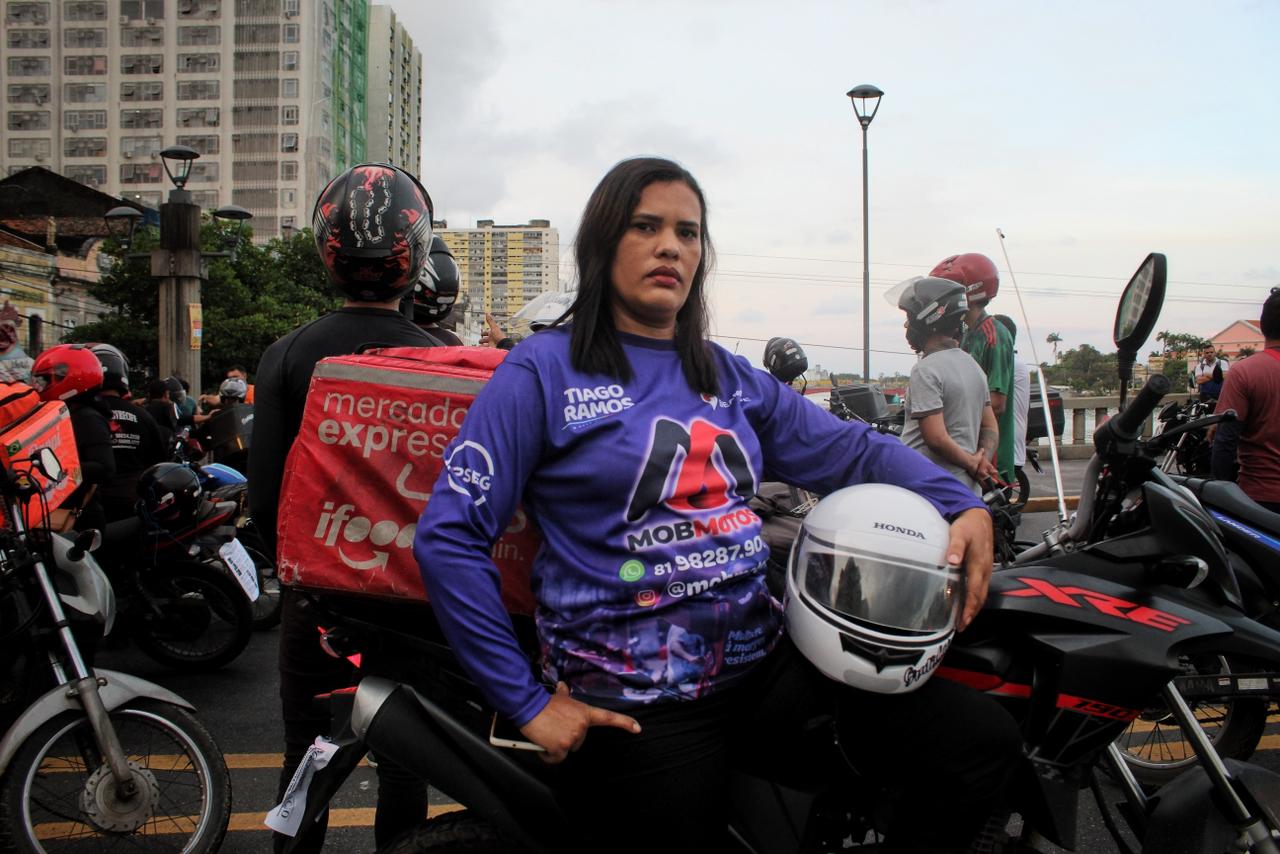
Delivery drivers say they suffer from exhausting workdays, low pay and poor health conditions. Credit: Paloma Luna
Algorithms, which often incorrectly determine distance, time and types of trips offered, further decrease pay. Workers operate at the will of the algorithm and have little recourse to find out why they are locked out of jobs or why kilometers are incorrectly calculated.
“There is a lot of uncertainty and lack of consistency when it comes to rides, how much you will get paid, and so on,” he says.
Gyaesayor, now general secretary of the Digital Transport Workers Union (DTWU), began joining together digital app workers by talking with platform drivers at car parks and shopping malls, urging them to come together to improve their conditions. Several associations representing couriers and other digital workers formed a small association in the Accra and Ashanti regions, By 2023, they created DTWU with a broader reach, joining the Ghana Trades Union Congress (GTUC).
Improve Working Conditions by Joining Together
The digital app union in Ghana, which includes car and bicycle drivers and couriers, is among dozens of platform worker unions around the world, with workers joining together to achieve key goals, including:
- Minimum wage standards.
- Safe working environments.
- Basic social protections such as annual leave, sick leave and retirement benefits.
- Labor law coverage in their countries grants them the same rights as all workers.
To gain these basic rights, workers are engaging in legal action to win unpaid wages, receive compensation for job-related injuries and establish safe working conditions. And, they are mobilizing to improve national and local laws.
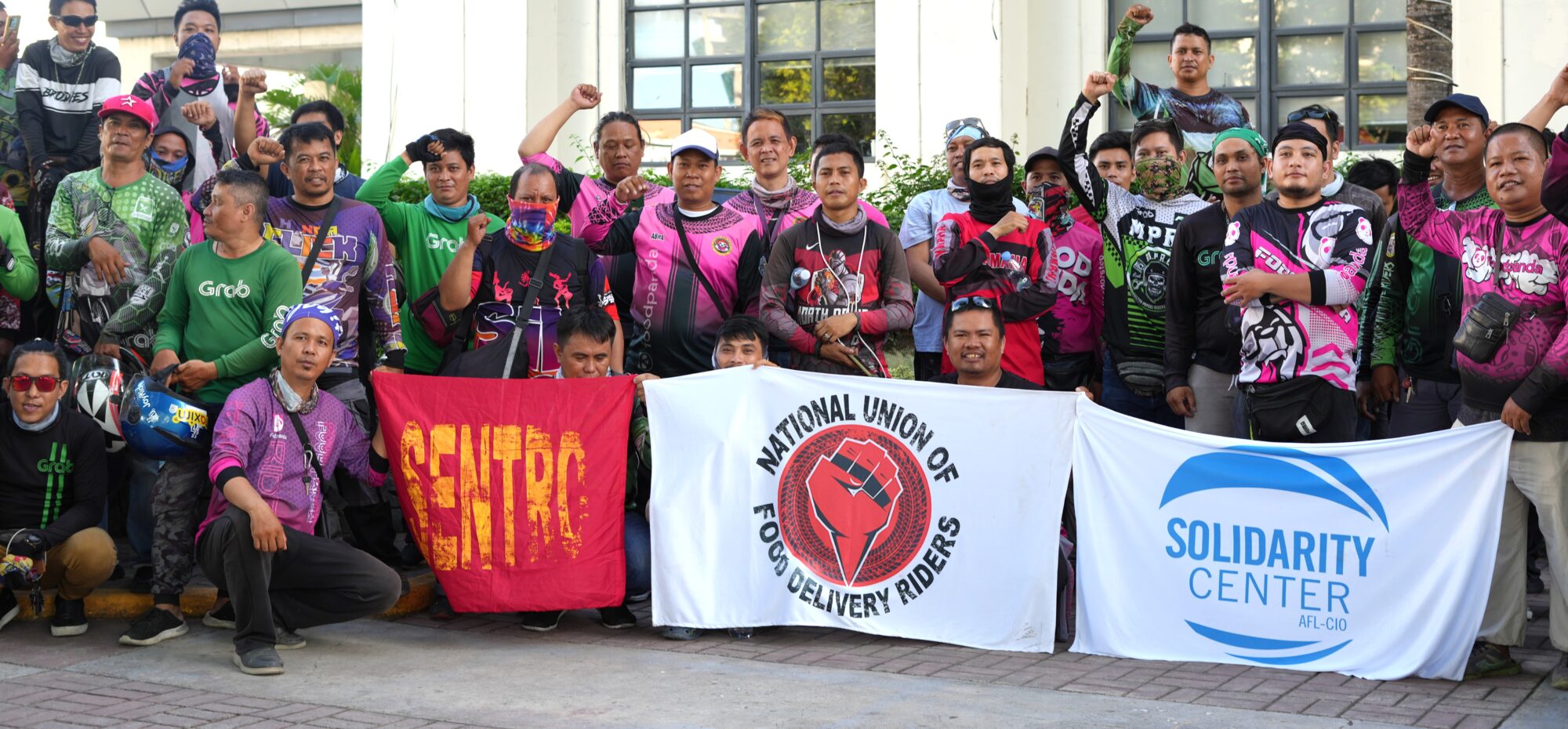
Food delivery riders improved pay at FoodPanda in Cebu, Philippines, part of platform workers’ efforts to assert their rights, protect their lives and improve working conditions.
across the globe.
Earlier this year in Mexico, app-based workers campaigned for — and won! — legislative reform that recognizes them as workers and provides access to accident insurance, pensions, maternity leave and company profits. In the Philippines, food delivery riders are improving benefits around the islands. In Cebu, Foodpanda drivers will receive a base fare of 55 pesos (94 cents) and the company will recognize them as employees.
Now, the workers are joining together to take their demands internationally.
Platform Workers Take Global Action
This week, platform work will be formally addressed for the first time on a global stage. At an International Labor Organization (ILO) conference in Geneva, digital app workers and representatives from business and governments are shaping a new international treaty, Realizing Decent Worker in the Platform Economy.
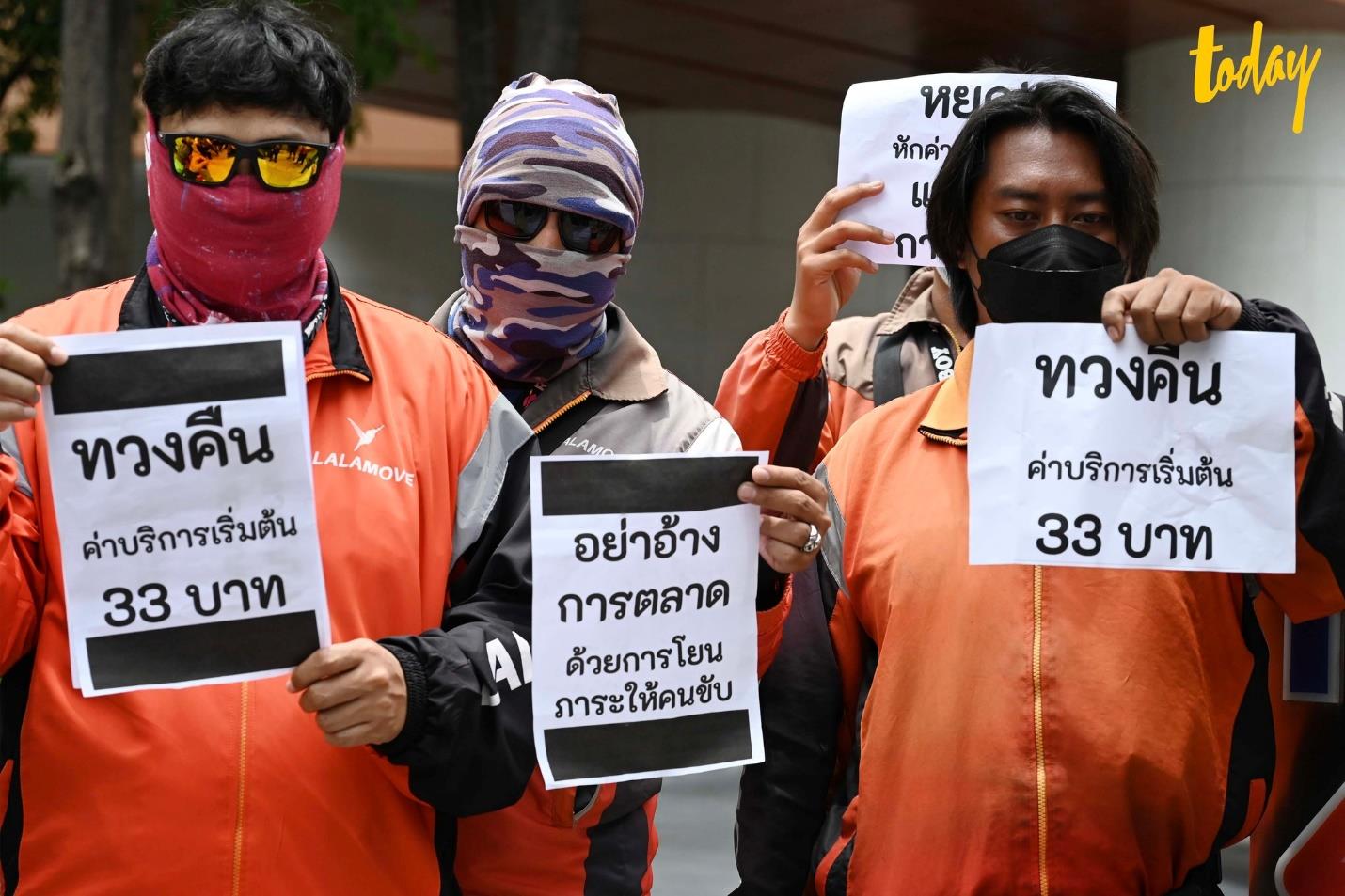
At an ILO conference in Geneva, digital app workers and representatives from business and governments are shaping a new international treaty to ensure decent work for platform workers around the globe.
Digital app workers have been crafting content that delegates will consider, and joining meetings with the International Trade Union Confederation (ITUC) and taking part in a six-day regional workshop in Togo by the ITUC-Africa. Platform workers also are involved in legislative strategies, meeting with their government representatives in advance of the conference.
Charith Attanapola, an app driver in Sri Lanka, met with the country’s minister of labor to convey platform workers’ challenges and discuss ways the government can improve working conditions.
“One of the key takeaways from our discussion was the government’s openness to ensuring decent work across all labor sectors, including app-based transport workers and delivery personnel,” says Attanapola.
Attanapola is part of the Solidarity Center delegation, which includes workers from Brazil, Chile, Ghana, India, Kenya and Mexico. As these workers testify, negotiate and help shape international labor standards that reflect the reality of their work and their demands, they understand the urgency in ensuring how jobs are shaped will determine the future.
In Ghana, where youth unemployment improved from 16.3 percent in 2000 to 5.4 percent in 2024, Gyaesayor knows that gain can be sustained only if decent work is available.
“Platform work has given employment to the majority of the youth; yet those of us who are working are being used like slaves, we get paid barely any salary,” says Gyaesayor. “The government must listen to the union, or things will get much worse; a lot of youth are going to be unemployed.”
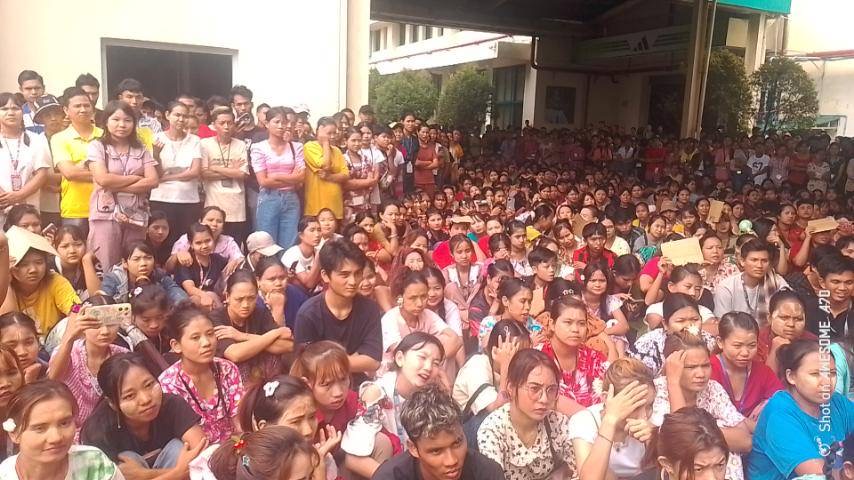
May 28, 2025
Thousands of garment workers seeking to boost a base daily pay of $2.47 (5,200 kyats) stood strong throughout a multi-day strike in Yangon, Myanmar, winning an agreement that increases pay and bonuses.
Marching along the sidewalk outside the factory chanting “daily wage, annual bonus, raise it, raise it,” and “the daily wage you pay is not enough,” striking garment workers negotiated a new wage they say will make it easier to purchase rice and cooking oil.
The agreement, effective in June and covering 6,269 workers, increases the base pay to $2.76 (5,800 kyats), boosts the additional daily allowance to $1.81 (3,800 kyats) from 95 cents (2,000 kyats) and a 19 cent (400 kyats) allowance. Garment workers also will receive an increase in overtime pay and attendance bonus pay.
With Collective Action, Workers Achieve Success
Unable to support themselves on their wages, some 4,000 workers at the Tsang Yih Co., factory went on strike May 14, and were joined by thousands more the next day. Workers remained on strike despite management threats to fire leaders. On May 17, management said the factory, which supplies Adidas, can dismiss them for three consecutive days of absence and told striking workers the company would bring in military soldiers and police.
The garment workers, assisted in their effort for better pay by the Federation of General Workers of Myanmar (FGWM), a Solidarity Center partner, continued the worker action, defying the risks involved in the country. In February 2021, a military coup took power, killing thousands of people and imprisoning many more, with union leaders especially targeted.
After management created a contract without workers’ consent that did not reflect their list of demands, the garment workers remained united in collective action. With military and police trucks at the factory’s entrance on May 19, 6,000 workers rallied inside the factory compound, chanting that the signatures on the “agreement” did not reflect their wishes.
When the Myanmar Labor Minister and other representatives came to the factory urging workers to return to the job, workers say the messages indicated force would be used to disperse them if they refused to resume work.
But with strength through collective action, the garment workers held strong, succeeding in negotiating a contract that benefited them and their families.





















